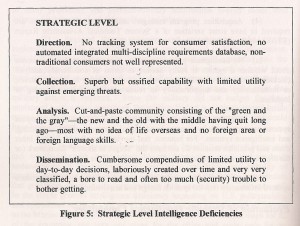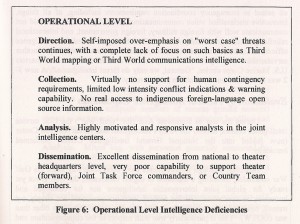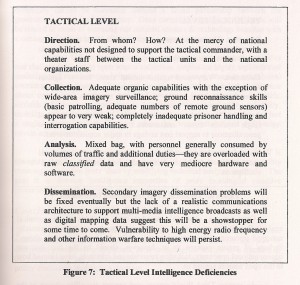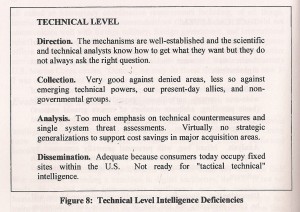
2000 ON INTELLIGENCE: Spies and Secrecy in an Open World p. 38

The truth at any cost lowers all other costs — curated by former US spy Robert David Steele.

2000 ON INTELLIGENCE: Spies and Secrecy in an Open World p. 38

2000 ON INTELLIGENCE: Spies and Secrecy in an Open World p. 39

2000 ON INTELLIGENCE: Spies and Secrecy in an Open World p. 41

2000 ON INTELLIGENCE: Spies and Secrecy in an Open World p. 42

As long as the strategy of “war on terrorism” remains the same, it's against the interests of the Pentagon to admit their strategy isn't working. In theory that could embolden the enemy. But let's look at two sides of that. The enemy seems to know better than we do how futile our strategy is in the long run. What they don't know is how long we'll be committed to it. So if the Pentagon were to publicly admit their strategy isn't working, that would be a sign that they may be on the verge of abandoning it, which could be useful information for the enemy. It could lead them to change their strategy.
Unfortunately this dynamic leaves Bush and Cheney with the perfect excuse for not admitting that their war policies were perhaps the most disastrous decisions made in American history. So it's very convenient for them. To publicly admit their enormous errors could have a negative effect on the war effort. That lets them off the hook.
But it also prevents America and Americans from learning from our mistakes. And this has been the dynamic since the end of World War II. Our policies in the Middle East have caused blowback on a scale that's unmeasurable. The war between Islamists and the West may not exist otherwise. And this war is shaping up to be far more complex than a war against communism, because the front lines aren't as clearly marked and terrorist can be anywhere.
After Eisenhower resolved the Suez Crisis, Arabs in the Middle East were cheering and holding up signs that said We Love America. How times have changed.
![]() Why Isn't the FDA Stopping the Epidemic of Foodborne Illness?
Why Isn't the FDA Stopping the Epidemic of Foodborne Illness?
The agency charged with overseeing the safety of our food is out to lunch. Here's why.
Barry Estabrook
Mother Jones, 5 December 2012
EXTRACT:
The 2011 listeria outbreak was not an isolated case. The United States is experiencing what amounts to an epidemic of foodborne illnesses. According to the CDC, there are about 48 million cases of food poisoning a year, leading to more than 128,000 hospitalizations and more than 3,000 deaths. E. coli in spinach and fruit juice, salmonella in eggs and jalapeño peppers, listeria not only in cantaloupes but in cheese and bagged lettuce-the toll from foodborne bacteria is mind-numbing.

So Much Strategy, So Little Strategic Direction
Cdr Michael Junge, USN
Proceedings Magazine, February 2012 Vol 138/2/1,308
There is a strategy problem in the Navy. Take as primary evidence that only three and a half years after completing A Cooperative Strategy for 21st Century Seapower , its primary author is now in favor of crafting a new strategy. 1 That strategy was published only four years after its predecessor, Seapower 21 . And that one came eight years after Forward . . . from the Sea , which itself was a two-year tune-up of From the Sea , which replaced the 1986 Maritime Strategy . In other words, the Navy has changed its strategy five times in 25 years—while its mission has remained unchanged for more than five decades.
Frankly, it’s not that the Navy has a problem developing strategy (five times in 25 years belies that idea), rather the issue is that the Navy no longer has a culture of strategic thought, and the lack of consistent, long-term, cohesive, and followed strategy is but a symptom of this problem. The Navy is now, and has been for decades, a tactical organization seeking, rewarding, and thriving on short-term, one-dimensional thought and quick, often indecisive action.
Continue reading “Dolphin: Assorted References on Naval Strategy”